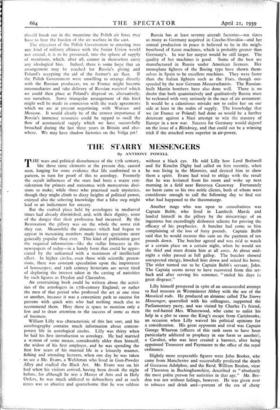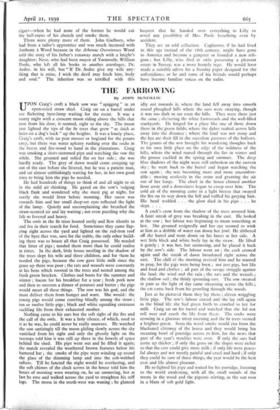THE STARRY MESSENGERS
By ANTHONY POWELL
THE wars and political disturbances of the r7th century, like those same elements at the present day, caused men, longing for some evidence that life conformed to a pattern, to turn for proof of this to astrology. Formerly the occult influences of the stars had been a major con- sideration for princes and statesmen with momentous deci- sions to make; while those who practised such mysteries, though they might climb to dizzy heights of political power, enjoyed also the sobering knowledge that a false step might lead to an indictment for sorcery.
But the exalted place held by astrologers in mediaeval times had already diminished, and, with their dignity, some of the danger that their profession had incurred. By the Restoration the pillory was on the whole the worst risk they ran. Meanwhile the almanacs which had begun to appear in increasing numbers made horary questions more generally popular than ever. This kind of publication gave the required information—like the stellar forecasts in the newspapers of today—in a handy form that could be appre- ciated by the unlearned with a minimum of intellectual effort. In higher circles, even those with scientific preten- sions, there was constant speculation upon the importance of horoscopes; and i9th century historians are never tired of deploring the interest taken in the casting of nativities by such figures as Dryden and Clarendon.
An entertaining book could be written about the activi- ties of the astrologers in 17th-century England; or rather the men of that period who professed the art at one time or another, because it was a convenient path to success for persons with quick wits who had nothing much else to recommend them. Here there is space to mention only a few and to draw attention to the success of some as men of business.
William Lilly was characteristic of this last sort, and his autobiography contains much information about contem- porary life in astrological circles. Lilly was thirty when he had his first introduction to astrology. He had married a woman of some means, considerably older than himself, the widow of his first employer, and he was spending the first few years of his married life in a leisurely manner, fishing and attending lectures, when one day he was taken to see a Mr. Evans, a Welshman who lived in Gun-Powder Alley and studied the Black Art. Mr. Evans was on his bed when his visitors arrived, having been drunk the night before, for although he was a Master of Arts and in Holy Orders, he was much addicted to debauchery and at such times was so abusive and quarrelsome that he was seldom without a black eye. He told Lilly how Lord Bothwell and Sir Kenelm Digby had called on him recently, when he was living in the Minories, and desired him to show them a spirit. Evans had tried to oblige with the result that he was levitated from his room and woke up next morning in a field near Battersea Causeway. Fortunately no harm came to his two noble clients, both of whom were considerate enough to call the following day to find out what had happened to the thaumaturge.
Another mage who was open to consultations was Captain Bubb, who lived in Lambeth Marsh and landed himself in the pillory by the miscarriage of an ingenious but exceedingly dishonest scheme for proving the efficacy of his prophecies. A butcher had come to him complaining of the loss of forty pounds. Captain Bubb said that he would recover this sum on the payment of ten pounds down. The butcher agreed and was told to watch at a certain place on a certain night, when he would see the thief and must detain him at all costs. At about mid- night a rider passed at full gallop. The butcher showed unexpected energy, knocked him down and seized his horse. The rider turned out to be Captain Bubb's servant, John. The Captain seems never to have recovered from this set- back and after serving his sentence, "ended his days in great disgrace."
Lilly himself prospered in spite of an unsuccessful attempt to find treasure in Westminster Abbey with the use of the Mosaiical rods. He produced an almanac called The Starry Messenger, quarrelled with his colleagues, supported the Parliamentary party, and was visited by Charles I's friend, the red-haired Mrs. Whorewood, who came to enlist his help in a plot to cause the King's escape from Carisbrooke, an occasion when Lilly waived his political opinions for a consideration. His great opponent and rival was Captain George Wharton (officers of this rank seem to have been particularly addicted to prophecy in one form or another), a Cavalier, who was later created a baronet, after being appointed Treasurer and Paymaster to the office of the royal ordinance.
Slightly more respectable figures were John Booker, who came from Manchester and successfully predicted the death of Gustavus Adolphus, and the Revd. William Bredon, vicar of Thornton in Buckinghamshire, described as "absolutely the most polite person for nativities in that age." Mr. Bre- don was not without failings, however. He was given over to tobacco and drink and—portent of the era of cheap cigars—when he had none of the former he would cut the bell-ropes of his church and smoke them.
There were plenty more of them. John Gadbury, who had been a tailor's apprentice and was much incensed with Anthony a Wood because in the Athenae Oxonienses Wood told the story of his father's runaway match with a knight's daughter; Neve, who had been mayor of Yarmouth; William Poole, who left all his books to another astrologer, Dr. Ardee. in his will, but" If Dr: Ardee give my wife any- thing that is mine, I wish the devil may fetch him, body and soul." The inheritor was so terrified with this bequest that he handed over everything to Lilly to avoid any possibility- of Mrs. Poole benefiting even by accident.
They are an odd collection. Cagliostro, if he had lived in this age instead of the 18th century, might have gone to America and become a gangster or founded a new reli- gion; but Lilly, who died in 1681 possessing a pleasant estate in Surrey, was a more homely type. He would have made a suitable editor for a Sunday paper designed for the unfastidious; or he and some of his friends would perhaps have become familiar voices on the radio.











































 Previous page
Previous page